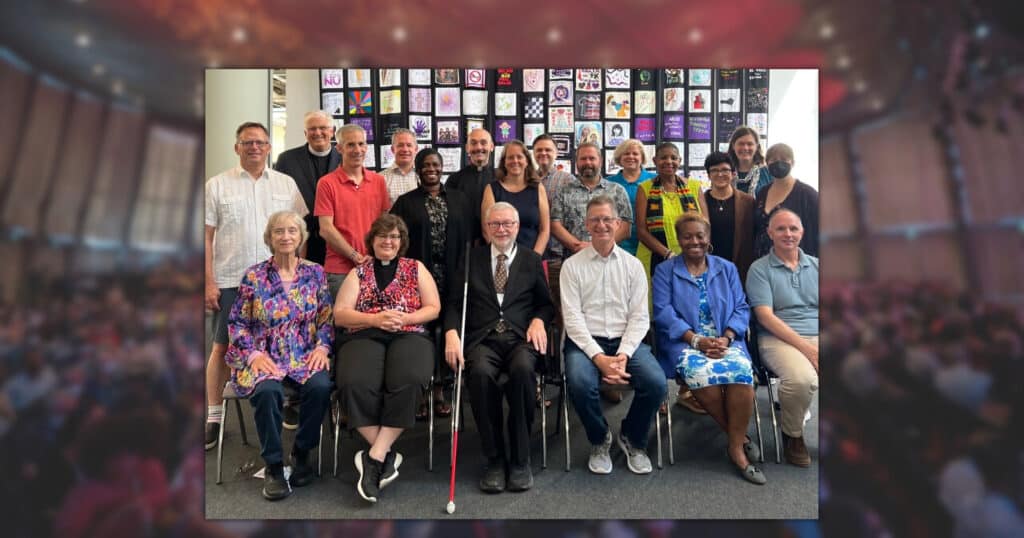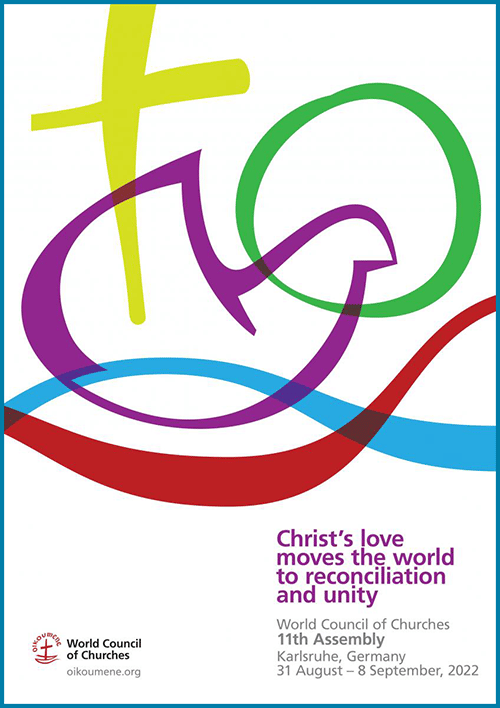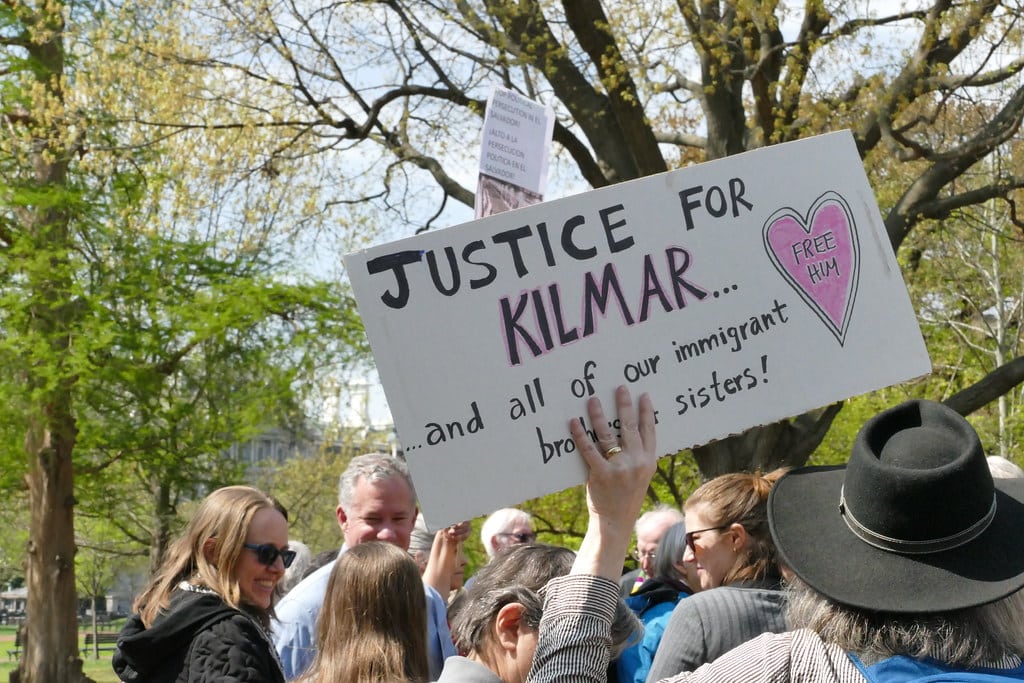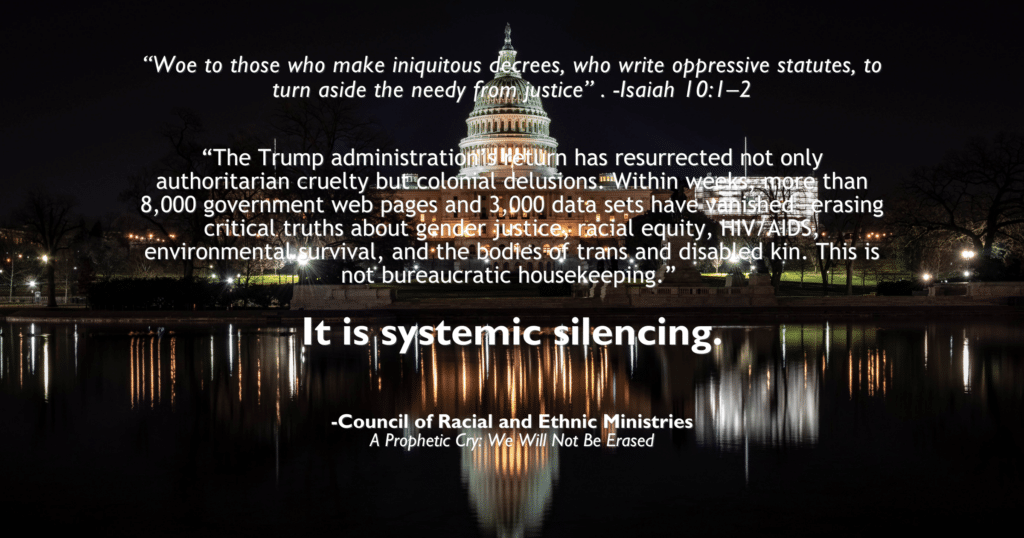UCC participants join in work of unity and reconciliation at 11th Assembly
The United Church of Christ was well represented as Christians from around the globe gathered for worship and dialogue – and spoke out on today’s urgent global issues.
Emphasizing mutual love and unity, delegates to the 11th Assembly of the World Council of Churches expressed their concern about climate justice, the war in Ukraine, Middle East peace and more. They discussed gender justice, women’s issues and Indigenous concerns. And they elected a UCC officer, the Rev. Karen Georgia Thompson, to the WCC Central Commitee, where she will also serve on its Executive Committee.
UCC people from national, Conference and local church settings were among the 660 delegates and 2,000 other participants who came from around the world to the event, held Aug. 31—Sept. 8 in Karlsruhe, Germany.
“These last two weeks in Germany were a dramatic testimony to the power of Christian siblings coming together in love and fellowship,” said the Rev. Dr. John Dorhauer, general minister and president, a UCC delegate.
Complete coverage of the assembly is here.
UCC participants contributed to ecumenical conversations throughout the gathering, covering a range of topics. “The Assembly was an incredible time to gather as a global church to remind ourselves of our shared commitment to the ecumenical vision, mirrored in our own UCC motto, ‘that they may all be one,’” said the Rev. Michael Neuroth, international policy advocate for the UCC Washington, D.C., office.
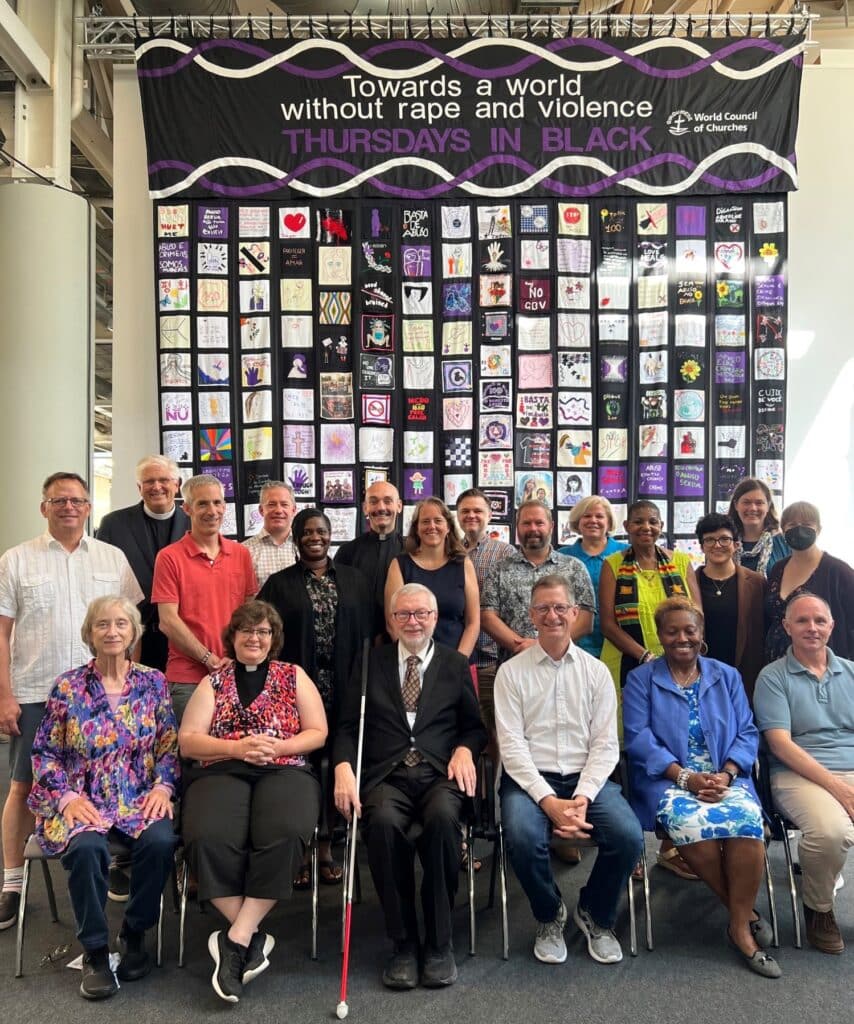
Speaking at ‘the well’
The “Brunnen,” German for “the well,” was the space where much of the action took place. A marketplace of workshops, networking zones, exhibits and performances, the Brunnen was a space for sharing, connection and unity. UCC people were among the speakers there.
The Rev. Barbara Breland, founding pastor of Destiny Temple of Faith UCC in Alexandria, Va., and convener of the Pan African Women’s Ecumenical Empowerment Network delegation to the Assembly, led a workshop at the well. Titled “Pilgrimage of Justice, Peace, Love & Ubuntu,” it reinforced the shared values of the Brunnen philosophy through storytelling and emphasizing the diverse voices of women of the African Diaspora and Africa.
The Rev. Michael Schuenemeyer, UCC team leader for Health and Wholeness Advocacy Ministries, led “Towards Wholeness: A Learning Journey on Matters of Human Sexuality.”
“I presented aspects of my own journey,” he said, “including being an out gay clergyperson serving on the reference group, as well as the experience of the UCC in our work on comprehensive sexuality education.” The workshop was prepared by members of the WCC Reference Group on Human Sexuality, using a new resource created by the group, “Conversations on the Pilgrim Way, Invitation to Journey Together on Matters of Human Sexuality.“
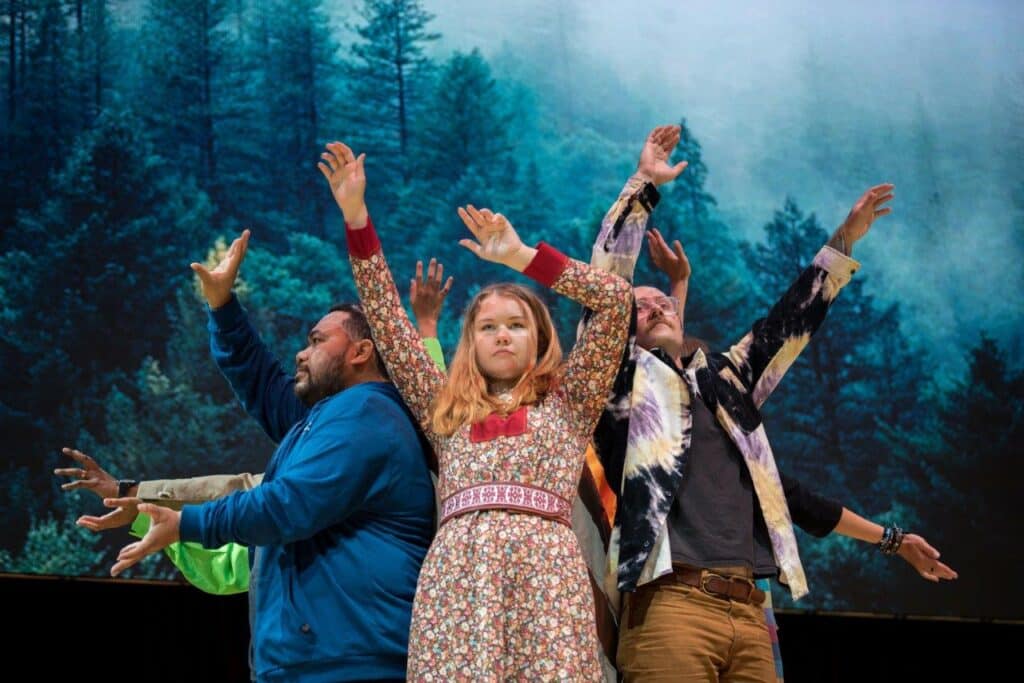
Timely topic: Just Peace
The topic of Just Peace came up repeatedly during the Assembly, and UCC people showed up as leaders in these conversations. Among them were:
- The Rev. Mark Pettis, UCC ecumenical and interfaith relations manager, who was on a panel about international law and human rights violations in Palestine/Israel — and churches’ responses. He spoke about a 2021 UCC General Synod resolution that addressed the topic.
- The Rev. Sheila Harvey, pastor at Union Congregational UCC in West Palm Beach, Fla., and Neuroth, who spoke at a workshop titled “Just Peace Church.” Along with German partners, they described efforts of churches in both countries to live into their witnesses as Just Peace churches.
“I was encouraged to see the language of ‘Just Peace’ woven throughout the assembly, and to see the outcome document, Things that Make for Peace: Moving the World to Reconciliation and Unity,” Neuroth said. As “a powerful call to engage collectively on the many challenges we face,” the document will help guide his advocacy work, he said. He encouraged UCC-wide reflection and action on it and the many other statements issued by the Assembly.
Busy delegates
Dorhauer and Thompson, who is associate general minister for Wider Church Ministries, were the UCC’s two Assembly delegates. In addition to his business responsibilities, Dorhauer spoke at a workshop on the impact of militarism and war on climate change, and the urgent need to bend “swords into plowshares.”
“Throughout the Assembly, we iterated our clear commitments to ending the crisis and rescuing a planet in the throes of an apocalyptic, dystopian unraveling,” he said. “That was very gratifying, and I pray with fervor that we all take action and combine our efforts to raise consciousness and commit to lowering our carbon footprint.”
In a session on Sept. 6, Thompson added to her list of roles as she was elected to the 150-person WCC Central Committee. It is the main decision-making body of the WCC, responsible for carrying out the policies adopted by the Assembly, supervising WCC programs, and managing the WCC budget. She will serve on that committee, which meets every two years, until the next Assembly eight years from now.
On Sept. 8, the Central Committee in turn elected Thompson to its Executive Committee, which meets twice a year.
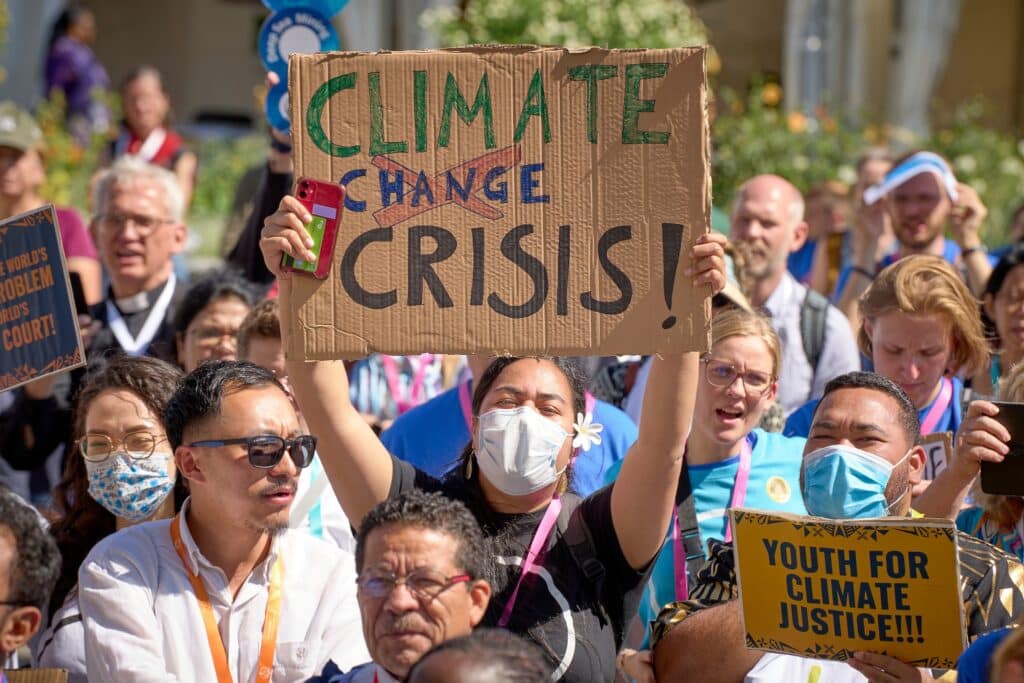
‘Dignity and respect’
On the same day she was elected to the Central Committee, Thompson spoke at a press conference on issues of gender justice, urging prioritization by churches and on a global level.
“Women are among the lowest, socially, in many communities and continue to be oppressed with the problems related to wages, earning power, employment, and are unable to live with the fullness of dignity and respect afforded as a part of their human rights,” she said.
She said the quest for gender justice must include global advocacy and women’s empowerment, including efforts to “call out the ways in which the church itself continues to support structures that contribute to gender disparities.”
‘Reconciliation and unity’
The Assembly centered on the theme, “Christ’s love moves the world to reconciliation and unity.” Amidst global concerns of the COVID-19 pandemic, the climate crisis, and conflict and human rights violations around the world, the goal of unity was no small one, UCC participants said.
“I deeply appreciated the way the body wrestled with tough issues that we knew had the potential to divide us,” Dorhauer said. “The pair of matters surrounding the war in Ukraine and the plight of Palestinians in the Occupied Territories demonstrated our collective capacity to stay in dialogue with each other even when the disagreements are pronounced and passionate. This ability to model civil discourse and love across divisions can become a balm to a world drifting father and farther apart.”
“The United Church of Christ is a part of the large ecumenical family,” Thompson said. “We are active participants on the pilgrimage of justice, reconciliation and unity in the shared vision and reality of seeing a just world for all.”
In the closing message from the Assembly, “A Call to Act Together,” delegates urged Christians to act from a unity founded in Christ’s love, “for it enables us to learn the things that make for peace, to transform division into reconciliation, and to work for the healing of our living planet.”
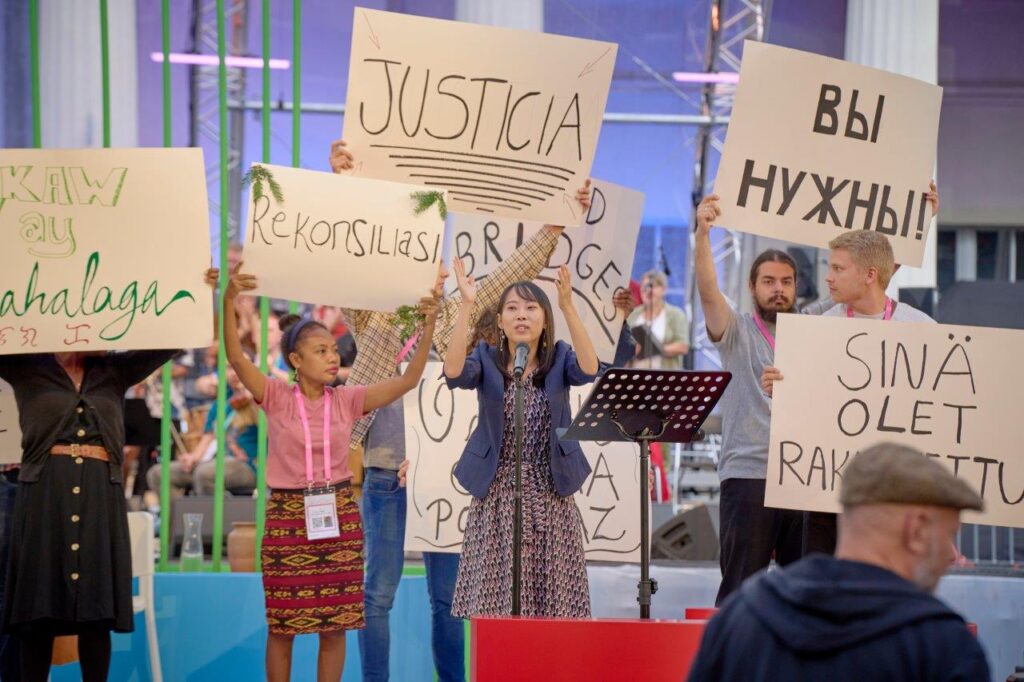
Jessica Quinn is based in Washington, D.C., as online communications specialist with the Office of Public Policy and Advocacy, part of the UCC’s Justice and Local Church Ministries.
Content on ucc.org is copyrighted by the National Setting of the United Church of Christ and may be only shared according to the guidelines outlined here.
Related News
UCC churches and faith communities join in protest of political prisoner
Members of Washington, D.C. area United Church of Christ congregations joined with other faith...
Read MoreMy Country ‘Tis of Thee
Lately, there has been much conversation about immigration policies in the United States. The...
Read More‘An exorcism attempt’: COREM statement calls out Trump administration’s harmful policies
The Council for Racial and Ethnic Ministries (COREM) released what they are calling “A...
Read More
